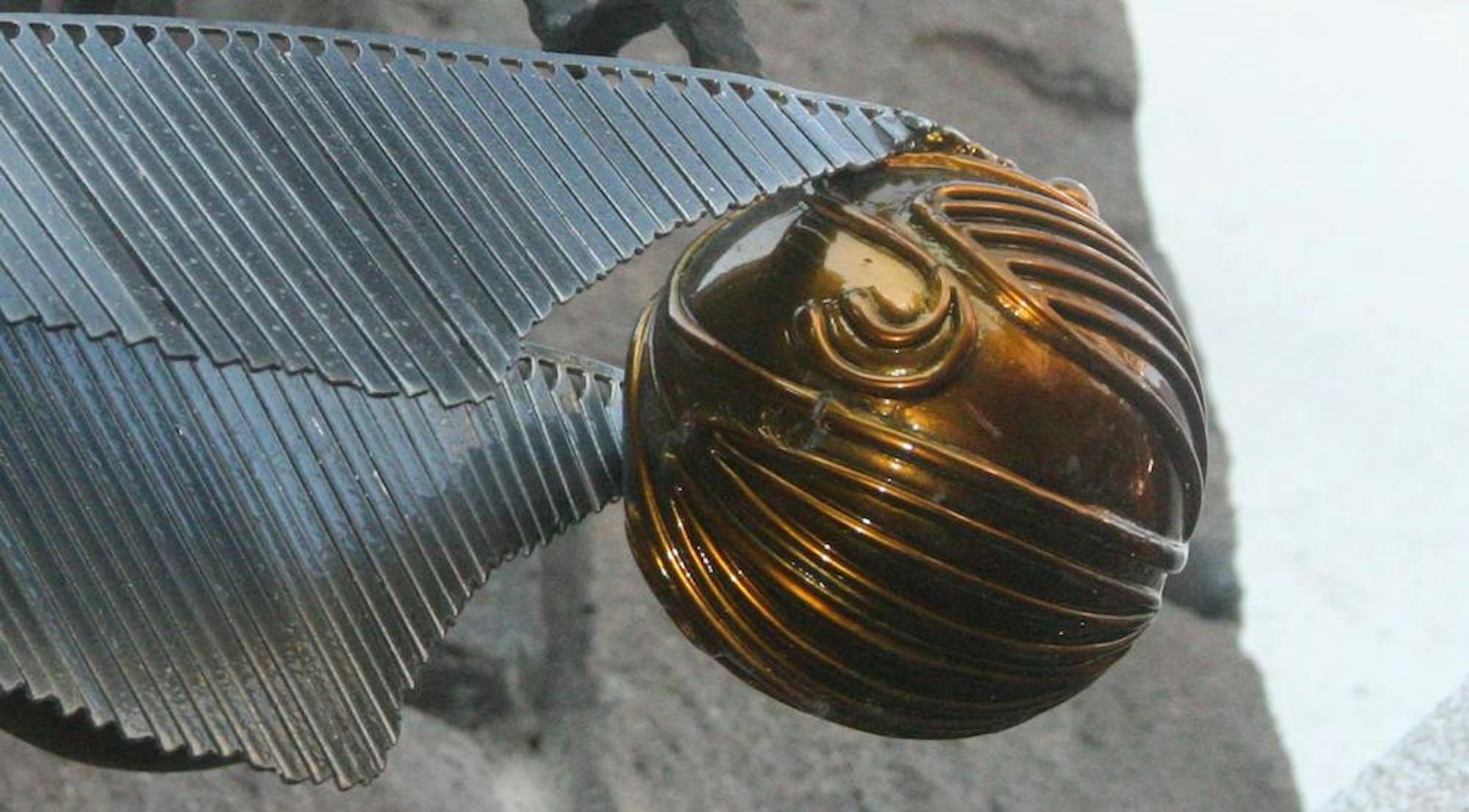
While the members of Emory’s newly-founded Quidditch team may not have mastered the art of flying just yet, the club sport is off to a sweeping start.
The Emory University Quidditch Team began in the fall of 2014 under the direction of Team Founder and Goizueta Business School sophomore Jackie Busman. Quidditch is the magical sport of J.K. Rowling’s celebrated Harry Potter series, and the opportunity to play on a collegiate team is a dream come true for many fans of the books.
What exactly is Quidditch, you may ask?
“It’s a combination between rugby and dodgeball,” College freshman and team Chaser Nate Silverblatt said.
Despite the lack of levitation present in the books due to the Harry Potter characters’ magical flying broomsticks, the muggle, or nonmagical, version of the beloved sport manages to involve a sort of “broomstick” of its own.
Busman explained that players must run up and down the field with a broomstick or a broomstick-like object held in between their legs.
Quidditch is a sport that is just as complex as any other, with different roles, rules and potential results.
“I like sport[s] that have multiple components going on that influence the outcome,” Laney Graduate student and team Seeker Warren Shull said, “and Quidditch is a good example of that.”
The team consists of seven players: three chasers, two beaters, one keeper and one seeker.
The chasers play both offensively and defensively, working as a trio to both score points with a quaffle (a slightly deflated volleyball) and defend their hoops (the equivalent of goals). Beaters focus on stopping the opposing chasers from scoring points by throwing bludgers (a slightly deflated dodgeball) at them, while simultaneously defending their own team’s chasers from the other team’s beaters. The keeper guards the hoops, acting similarly to a goalkeeper, and the seeker’s sole job is catching the golden snitch.
In the Harry Potter books, the golden snitch is an enchanted flying ball that is extremely difficult to catch due to its miniscule size and incredibly fast speed, but Emory’s team uses a slightly different version.
“The [golden] snitch is a person who is dressed all in gold who runs around a designated area,” Busman explained. “Because we don’t have flying magical balls, unfortunately.”
Busman knew that she wanted to play collegiate Quidditch while was applying to college. Though Emory had no team at the time of her acceptance, the idea was always in the back of her mind.
“I definitely thought about [starting a Quidditch team] my freshman year,” Busman said. “I was fairly involved, but I felt there wasn’t necessarily a place [at Emory], a club that was specific to me. I wanted to create my own place.”
However, Busman quickly realized that the process of starting a club sport at Emory was more difficult than she had initially realized.
Emory’s club sports program requires that new teams are approved by the current official club sports teams and that they are financially independent from the University for one year.
After many phone calls and one fateful meeting, Emory granted Busman permission to start a Quidditch team in the spring of 2014 with a 96 percent acceptance rate from the other club sports teams.
The team began holding practices in the fall of 2014. While not yet an official club sport at Emory due to the required year of financial independence from the University, the team still holds practices twice a week on McDonough Field.
Busman admitted that the team floundered for the first semester.
“We were very new, and we didn’t know what to do,” she said.
However, as Busman and her team started to get their feet, and their brooms, off the ground, they saw much interest from the Emory community, as well as from the surrounding Atlanta area.
Not only were Emory students, undergraduate and graduate alike, enthusiastically joining practices, but Busman revealed that she was even contacted by two roller derby coaches who were looking to practice with the team.
Though some may find the idea of playing Quidditch laughable, Busman is quick to passionately defend the sport.
“It is currently the widest growing sport in the world,” she said. “It is established in over 80 countries, there are hundreds of teams in the U.S. alone [and] there is an international association.”
And while the muggle version of Quidditch may look slightly ridiculous, it is played as a full contact sport, requiring complete physical activity.
“It’s obviously a sport straight out of a fiction book,” Silverblatt admitted, “but the sport itself is very, very real. It’s physically demanding.”
The Emory Quidditch team has yet to play a game, though they hope to be a part of a tournament in the coming year.
Their focus for the immediate future is not so much winning games as it is creating a permanent team at Emory.
“I hope to one day have a team when I can have full scrimmages,” Busman said, “to come back after graduating in a few years [and watch the team].”
However, her plans don’t stop there; she also wants to host a Yule Ball, a formal holiday dance in the Harry Potter series, at Emory once the team receives more funding.
Busman also shared her pride for the effort that her team has put in thus far, despite the youth of the club.
“I’m really just proud that my team can come together and have such a great time,” Busman said. “I’ve never been in sports, so I didn’t quite have that team feel before, but ever since we’ve started there’s been a huge effort on everyone’s part.”
Her team members are equally as excited for the presence and the growth of the club on Emory’s campus.
“What I love about it is that it’s not a traditional sport,” Silverblatt shared. “I grew up a huge Harry Potter fan. I love that it’s different.”
- By Julia Munslow, Staff Writer
Quidditch Club's Magic Takes Off at Emory
According to J.K. Rowling's Harry Potter books, a Quidditch game is decided when one team's seeker captures the Golden Snitch. In the real life version, it is a person dressed in gold. | Courtesy of Judithcomm/Wikimedia Commons





